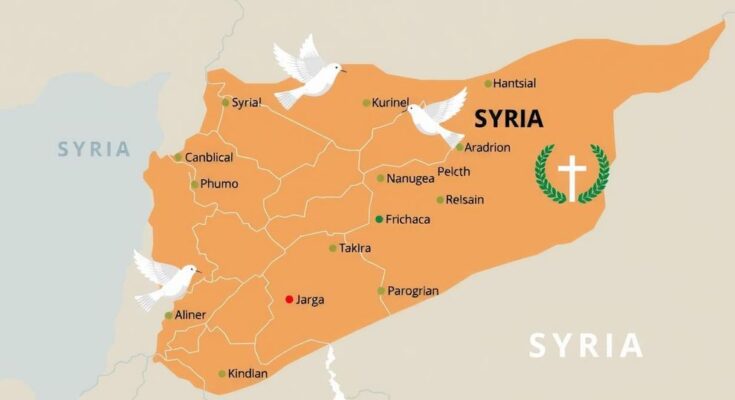A recent deal signed between Syria’s interim government and the Kurdish-led SDF aims to promote national reconciliation by integrating military and civilian institutions. This agreement comes amid serious security challenges and raises questions about implementation, especially following a controversial constitutional declaration that centralizes power. The deal has garnered international support but faces criticism regarding its details and the future role of the Kurdish community in Syria’s governance.
In an effort to promote unity within the Syrian Arab Republic, a significant agreement was signed on March 10 between the interim government and the Kurdish-led Syrian Democratic Forces (SDF). However, the implementation of this deal is fraught with uncertainty, particularly in light of a recent constitutional declaration that raises questions about its effectiveness in fostering national reconciliation.
This agreement is pivotal as it aims to integrate military and civilian institutions into the broader Syrian state. As President Ahmad Al-Sharaa faces increased international scrutiny, the deal could play a crucial role in reshaping Syria’s post-war dynamics, especially amid ongoing security challenges faced by the country.
Nanar Hawach, a senior analyst with the International Crisis Group, notes that the urgency of the agreement arises from major security threats, including recent violence and foreign military incursions. The deal and its timing reflect Damascus’s recognition of the need to secure stability.
Furthermore, according to Mutlu Civiroglu, a Kurdish analyst, this agreement allows President Al-Sharaa to position himself as a representative leader committed to inclusivity for all ethnic identities in Syria. The SDF commander-in-chief, Mazloum Abdi, is regarded as a respected figure across various communities, which may facilitate collaboration towards national unity.
The SDF and the Autonomous Administration of North and East Syria have condemned attacks against Alawite minority groups, which have led to violent reprisals. Abdi characterized these assaults as part of a systematic campaign against minorities, urging governmental intervention to protect vulnerable communities.
The recent spate of violence, which has included significant casualties, highlights the precarious security situation in Syria. Rami Abdulrahman from the Syrian Observatory for Human Rights indicated that many fleeing Alawites perceive a potential SDF presence as a means of achieving safety in their regions.
The anticipated implementation of the Damascus-SDF deal by the year’s end acknowledges the Kurdish community’s identity as indigenous to Syria, granting them essential citizenship rights. This cessation of hostilities in SDF-controlled zones is also critical given ongoing Turkish military actions.
Additionally, the agreement incorporates economic dimensions, particularly concerning Syria’s oil resources. Joshua Landis contemplates that control over oil fields, with provisions for shared revenue, symbolizes a strategic victory for both parties, enabling economic revitalization efforts essential for reconstruction.
The reconstruction of Syria’s oil sector, which has suffered drastic declines, is viewed as fundamental to the country’s recovery. Acknowledging the northeast’s resource abundance, analysts argue that the deal could herald cooperative efforts against extremist forces and enhance governance under a unified state.
Despite the positive reception from international entities, there remain concerns regarding the practical implementation of the agreement. Experts highlight that, while it affords a measure of autonomy, considerable unresolved issues persist regarding military integration and distribution of power.
The SDF’s integration into the Syrian Defense Ministry poses challenges, especially regarding their existing military structure and autonomy aspirations. Observers note that achieving a balance similar to Iraq’s semi-autonomous Kurdish governance remains uncertain, given the centralized approach desired by Syrian leadership.
Moreover, the newly signed temporary constitution, which establishes a transitional government, has been criticized by the SDF’s political representatives for centralizing authority and stymying democratic processes. They have advocated for a comprehensive reformulation of this declaration to ensure equitable power distribution and protect the rights of all ethnic minorities within Syria.
In conclusion, the groundbreaking deal between the Syrian interim government and the Kurdish-led SDF represents a significant step toward potential national reconciliation. However, the agreement’s successful implementation will hinge on resolving complex military and constitutional issues, as external support and internal coherence are essential for fostering stability in post-war Syria. The agreement may pave the way for inclusion and economic recovery, but its effectiveness remains uncertain amid ongoing violence and governance challenges.
Original Source: www.arabnews.com




